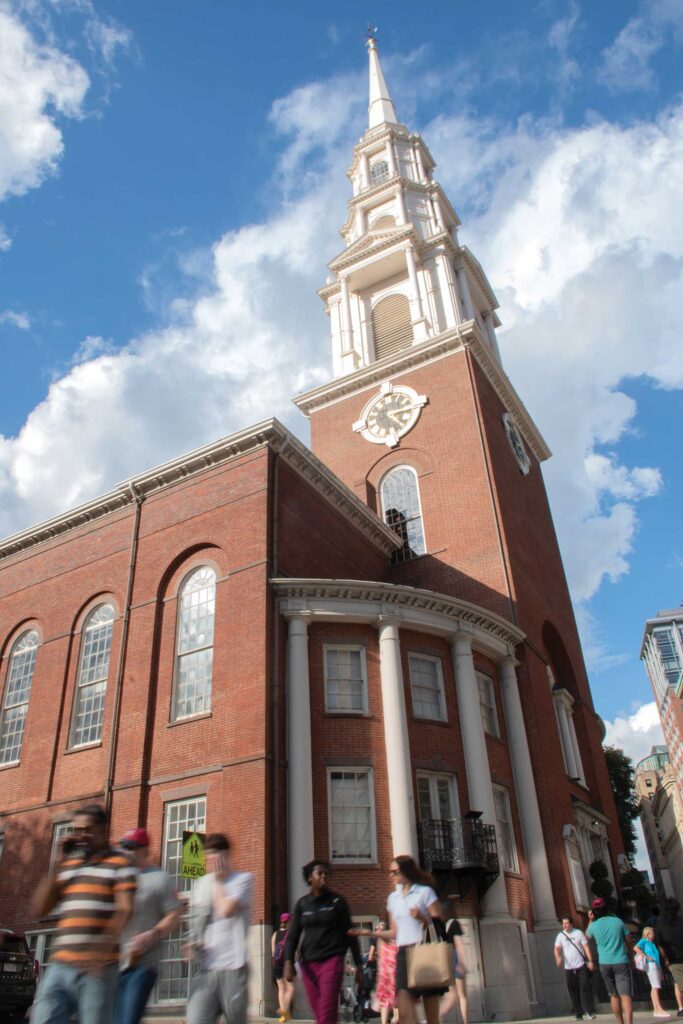Local architect proposes new historical trail with focus on abolitionists in Boston

An effort by a local architect and urban planner would see a new historical trail, focused on the city’s abolition history, crossing downtown Boston from the West End to Chinatown.
The Architects of Freedom Trail would attempt to fill what Joseph Edgecombe, its creator, sees as a gap in commonly known local history.
“That story is a missing link in history, a missing gap in history between the colonialists, moving into the post-Colonial era, the abolitionist era and then the pre-Civil War era,” Edgecombe said.
Edgecombe began developing his trail — he calls it a work in progress — in 2003 and first announced it in 2008. Stops would include Faneuil Hall, where abolitionists hosted rallies beginning in the late 1830s, and Park Street Church, where William Lloyd Garrison gave his first antislavery speech.
The trail would focus on the efforts of both Black and white abolitionists who fought against slavery in the United States in the early 1800s.
Byron Rushing, president of the Roxbury Historical Society, said that, while downtown Boston could feature a trail about everything — there are already ones focused on Boston women’s history, technological innovation, Black Bostonians through the Civil War and the popular Freedom Trail — it isn’t clear that another is necessary.
“The question is whether you need another one,” Rushing said. “The question is whether they’re already done and just have different names.”
The Freedom Trail already includes stops like the Park Street Church, while the 1.6-mile Black Boston Heritage Trail has a stop at the home of John J. Smith, a Black abolitionist and activist.
An already existing project called Abolition Acre focuses on the leadership of Black Bostonians in the abolitionist movement, especially in a compact area near City Hall.
The Abolition Acre effort, which was conceived by late activist Horace Seldon and is being created by the nonprofit Beacon Hill Scholars, includes a 10-stop self-guided walking tour from the site of the Boston Massacre at the Old State House — which also appears on the Freedom Trail — to the memorial honoring the Massachusetts 54th Regiment on Boston Common.
Edgecombe said he wasn’t aware of the work of the Abolition Acre effort.
Christle Rawlins-Jackson, president of Beacon Hill Scholars, said a guided audio tour of the Abolition Acre trail is being developed and is nearly complete.
Like Edgecombe, Rawlins-Jackson said the area’s abolitionist history deserves more attention, suggesting that it should be talked about on the same level as heroes of the Revolutionary War.
“Everybody knows about Paul Revere, but most people, when you ask them about the abolitionist movement and the Black people who took part in that, don’t know anything about it,” Rawlins-Jackson said.
She cautioned against calling that history “lost,” though.
“If you look for it, it’s there,” she said. “I think that’s really important to change the terminology that’s used when we talk about Black history.”
Edgecombe said he hopes his trail will help those who walk it move beyond focusing on a single figure and developing a broader understanding of the history. He said he believes the Black Heritage Trail fails to string together a story for the history of Black Bostonians the same way the Freedom Trail does for Revolutionary War history. That would be a goal of his Architects of Freedom Trail.
“It goes far beyond just getting somebody to idolize somebody like Crispus Attucks or something like that,” Edgecombe said. “This is the real truth, the real history of Boston.”
Edgecombe has been working on developing his trail independently, and it is not affiliated with an academic or historical organization, unlike other trails in downtown Boston. For instance, the National Park Service offers guided tours of the Freedom Trail and Black Heritage Trail; the Abolition Acre is supported by the National Park Service as well as the Museum of African American History and Roxbury Community College.
Rushing said he’s not convinced that Edgecombe’s independently developed trail will greatly add to historical knowledge about downtown.
“If you try to do these all by yourself, it’s bad history. Who are his advisors? Where is the Museum of African American History in this work?” Rushing said.






